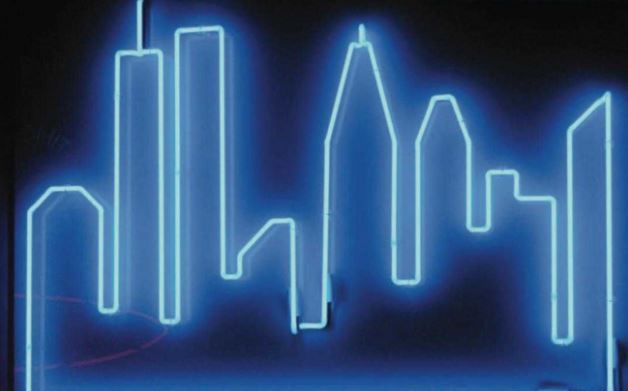“’Welcome to Neon Golgotha, sir,’ greeted a husky voice from within the dark foyer. A crimson skinned one eyed demon in piccolo garb emerged from the shadows, grinning reassuringly. ‘A home away from home.’”
I’ve sometimes wondered, and I’m sure others have too, why Hell should be a place of eternal torment. Wouldn’t Satan want to take care of sinners in order to drive them away from God? Why wouldn’t it be a place where evil people are allowed to indulge in their vices? Horror author Michael Faun has obviously wondered this too as it makes up a central theme in his latest novelette Neon Golgotha.
Each of the five chapters of this follows a different character from each of the five boroughs of New York City. In “Lavender Boys,” a gay, rich Manhattan man takes pleasure in picking up homeless men and bringing them home. One day, he meets a bum who doesn’t take kindly to his advances. In “Skag Jojo,” we see the last thoughts of a Bronx junkie as he overdoses on heroin. In “Krokodile Dundee,” an Australian trapped in Brooklyn by his heroin addiction begins hallucinating while on the subway. He becomes convinced the other passengers are giant insects. In “Pinball Madness,” a Queens waitress with a history of mental illness snaps under the pressure of demanding customers. In “Pink Mouth Winstrol,” a Staten Island female bodybuilder with body dysmorphia turns to steroids to insure she’ll win her next competition. Her misuse of them leaves her paralyzed alone in her apartment.
All the chapters deal with different characters from different walks of life, but are connected by the fact that when they meet their demise, they find themselves at the hotel Neon Golgotha in the afterlife. In their rooms, they relive the most reprehensible things they’ve done in their lives. Rather than finding this horrifying, they very much enjoy it. For example, Joel, the Bronx junkie in “Skag Jojo,” finds that his room is his old home with his alcoholic mother. He happily chooses to relive the night he raped her when she was passed out from drinking.
The book I was reminded of most while Neon Golgotha was Poppy Z. Brite’s Exquisite Corpse. It’s full of vivid, color descriptions of murder, decay, and self-destruction. It’s a decadent look into the mind of evil characters. From the poor junkie in the Bronx, to the middle-class bodybuilder in Staten Island, to the rich Manhattanite, Faun looks at the transgressions of damaged humans from different backgrounds.
My major criticism of the book is with its epilogue. It’s a short recounting of the demonic manager of Neon Golgotha leaving work for the day. The epilogue strongly implies that a stay in Neon Golgotha is torture to many, however, this didn’t come through in any of the chapters. All of the characters are shown as enjoying their stay in the hotel. The cosmology is vague in this book, which mostly helps it more than it hurts. However, it could have used just a bit more elaboration on how the hotel affects people in different ways.
Review copy provided
Some of the coverage you find on Cultured Vultures contains affiliate links, which provide us with small commissions based on purchases made from visiting our site. We cover gaming news, movie reviews, wrestling and much more.



